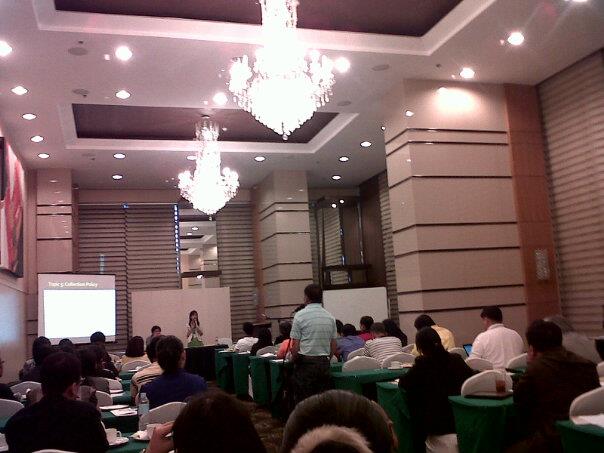WHY CHARTER CHANGE?

By: Lito C. Lorenzana | October 3, 2013
President at Centrist Democracy Political Institute
1Loves.
0Comments.
1People boxed this.
WHY CHARTER CHANGE?
The obvious answer to the question of WHY CHANGE THE CONSTITUTION is another question WHY NOT? WHY NOT INDEED?
This is not a facetious statement thrown to a burning issue of the day.
We have just listened to the sectoral leaders argue their case in favor of a change in the charter.Â
Their positions to summarize: Â Â Â Â Â
Indigenous people’s representative_______          Â
Business and Professionals_______ Â Â Â Â Â Â Â Â Â Â
Women________ Â Â Â Â Â Â Â Â Â Â
Urban Poor________ Â Â Â Â Â Â Â Â Â
Global Filipinos________ Â Â Â Â Â Â Â Â Â
Muslims__________
They are unanimous in their conviction that change is imperative partly because of their exasperation on the present state of affairs affecting their lives. Life is almost intolerable. This they attribute to the failure of our constitution to respond positively to the needs of their own sectors and therefore, we must come up with another charter. This is a legitimate demand and must be addressed well. (The Americans have a quaint phrase for it…â€If it aint broke, don’t fix it. If it is, get a new one!)
I will endeavor to reinforce their arguments and situate them within the context of the present political terrain and the present charter or basic law.
I refer to the 1987 Constitution of the Aquino incumbency. Freshly out of the clutches of a repressive regime, Aquino discarded the 1973 Marcos Constitution. It was not of her choosing. The extra constitutional act that gave birth to her government paradoxically obliterated the raison d’etre for the document that gave the Marcos martial law institutions their legal façade. The regime had a rare opportunity to use the very same martial law instruments to destroy the vestiges of the Marcos dictatorship, which were more that a decade in the making. She opted not to do it.|
EDSA 1 thrusts upon an unprepared political leadership the control of the levers of power. The ambivalence by the new ruling group in the uses of power compelled it to hastily write a document as a self-guide and to provide it a modicum of legal underpinnings, which in retrospect, was not required. It was not well understood at the time that her regime was legitimate and legal by the direct act of the people. The hastily written “Freedom Constitution†was likewise hastily discarded for another one, this time, a much longer one, soon to be ratified as the 1987 Constitution. Both documents had one driving motivation - they are to interpret the EDSA 1 phenomenon – which is the desire of the populace to bring back democracy to a tortured land.
Perhaps, heroically, from her standpoint, she needed to impress upon the people her total commitment to democracy – in total contrast to what Marcos did in the decade past.
She merely promised the return of democracy, and that she did - nothing more, nothing less.
The first fallacy was in the modality of change.
The infirmities of the 1987 charter, not obvious at that time, are now much clearer – in both substance and form.
The promulgators of the 1987 constitution were good and upright men and women who were chosen by the regime to fill a void – a basic document – that must be glaringly perceived in stark contrast to the just discredited Marcos regime. The motives and the sincerity of the 50 chosen few may not be put to question, but still they were selected with the advise and help of another chosen few, the presidential advisers.
Though no fault of the good President, she was born to the elite ruling class with interests intertwined in the social-political-economic fabric of the nation. Her choices, captives of this emerging benevolent regime were given the important task of writing a constitution that must reflect the aspirations of a large majority of the constituents whose values were perhaps alien to them.
Thus in that constitution, pre martial law elite democratic institutions coupled with the residue of the Marcos dictatorship were passed on.
There were not much public discussions and debate on the issues of the day except among the cognoscinti. The complete and blind trust exhibited by the people toward the persona and sheer charisma of the Presidency in the earlier days and the lingering euphoria of the revolution propelled the overwhelming acceptance and ratification of the 1987 constitution.
In retrospect, the core of the fallacy lies in the failure in the constitutional writing process to raise the political consciousness of the clientele – the people. This elemental infirmity contributed to the subsequent erosion of the people’s high expectation and the current belief that the charter does not respond to their aspirations.
They need a new one and a fresh start.
The second fallacy was the notion that a constitution must be all encompassing and detailed.
This attempt to cover a wide variety of conceivable situations and conditions to improve the institutions that must serve the constituentsare now perceived to be a major cause of the charter’s failure.
Given the realities of post EDSA 1, the fledgling government had to pay political dues to its neophyte allies that brought President Aquino to power: the movers and shakers representing the thin but influential middle class; the emerging leaders of the NGOs and their grassroots cohorts; the religious sector and even old pre martial law traditional politicians, who at the propitious moment, change sides - were likewise unfamiliar or cynical to the concepts and nuances of good governance. They all brought their agenda to this written document. This compendium of demands and clash of values somehow had to mesh.
To date, a score of these provisions have not been enacted giving rise to a legitimate concern that the document merely serve the requirement of the elite and their political cohorts at the two chambers, who are tasked to flesh these out.
One of the fruits of this document was the glaring failure of the land for the tillers concept, translated later into the Land Reform Act. A host of discrepancies and failures attributable to the 1987 charter can be mined. But this is not the topic today.
There are other fallacies and errors aside from the two I pointed out. But let me further buttress my case by positing some important briefs to seal the arguments for Charter Change.
Then EDSA II burst into the scene. What triggered the outburst was the perversion by a legitimate body, the senate to perform a constitutional duty – the impeachment of a sitting president, whose excesses were flaunted directly against the faces of the poverty stricken people.
It is ironic that this extra constitutional act must be consummated to underscore the failure of a constitutional process.
The perversion continues to this day but the Filipino cannot afford this high level of tolerance. Thus far, the people has endured two and a half decades of all sorts of ills and combinations of political measures that can be directly attributed to the failed basic law.
While it is now clear that we need good governance to help solve the myriad problems, the present system is not responsive. We need alternatives. And we need to think outside of the box.
The next speakers will deal with some of these. I refer to the Federal System. The Hon. Senator Aquilino Pimentel, its foremost passionate advocate will discuss the merits, advantages and nuances of a system that is now adopted by a majority of the developed and developing economies in the world.
Let me however put forward a thought that Charter Change too, to be successful must be executed with near perfect timing and sequence – and perhaps a serendipitous push. This last element has been provided by a sitting president who has declared that she will no longer run but will work through the remainder of her term for her legacy.
The clamor for constitutional reforms failed in the past two administrations on the suspicion that the motives of the proponents were less than honorable. The first was perceived to want an extension of the presidential term limits – as a response to a debilitating economic and financial crisis. The second was seen to want to open our patrimony to foreign ownership and control.
The cry by well meaning and sincere people for legitimate change in the constitution at that time was drowned in the cacophony of accusations from mainly the allies of EDSA 1 and most especially the politicized church hierarchy. But this was not a defect. This was a perfectly logical conclusion to an inability by the proponents to bring the message across.
And this is where I reinforce a corollary to my arguments. Central to charter change is the ability of the proponents to convey in a clear and no uncertain terms WHAT TO CHANGE! AND WHAT NOT TO CHANGE!
This is why we are here today and why need to meet. These are the topics for the subsequent speakers. Let this be the beginning of a massive campaign to initiate a dialogue with our clientele on what we need to change and what not to change. Each proponent of change has its own reason. I submit that they are all legitimate. But the process of change must carry with it the obligation by the knowledgeable to raise the political consciousness of those less endowed. It is incumbent upon us to therefore instigate a national debate.
Let us help SHAPE THIS DEBATE !
Â
Lito Monico C. LorenzanaÂ
Delivered 2/24/03Â
Club Pilipino
- More From this Author
- Comments








